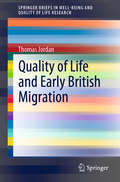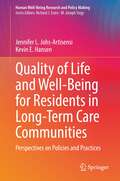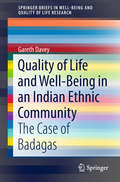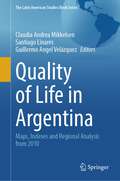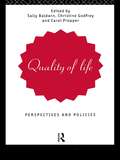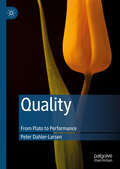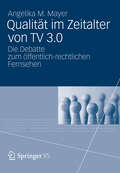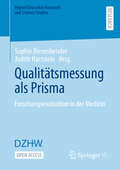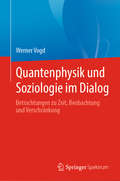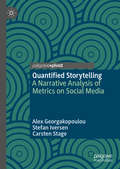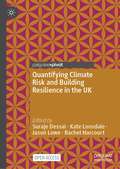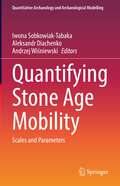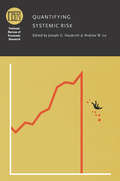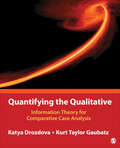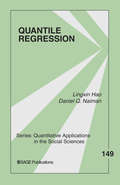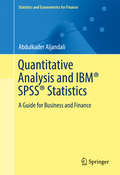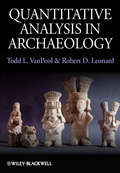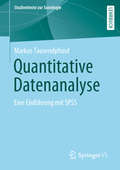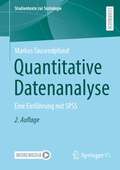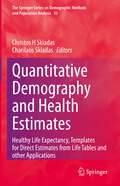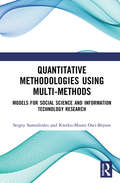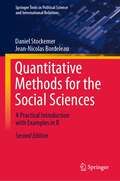- Table View
- List View
Quality of Life and Early British Migration (SpringerBriefs in Well-Being and Quality of Life Research)
by Thomas JordanThis book discusses the quality of life of early modern Britons emigrating to the New World, which became possible with advances in shipbuilding and long-distance sailing. It examines the status and quality of life of those crossing the Atlantic Ocean under legal contract, the indenture – largely to the Carolinas and the communities adjoining Chesapeake Bay in the USA in the 17th century, and also describes and numerically estimates the quality of life among Britons sentenced to “transportation beyond the seas,” who were transported to Australia in the mid-19th century. The author examines the experience of migrants, both adults and children, traveling to the New World and their fate, drawing on documentary sources like state historical records as well as self-documentation from the few surviving diaries. The book also creates profiles of the quality of life of emigrants by gender and age and places the processes of emigration in the social–political contexts of the 17th and 19th centuries.By considering ways in which aspects of social life were organized in eras before structural inquiry into the quality of life, the book provides interesting historical perspectives as well as methodological insights. It appeals to researchers and students interested in the quality of life and wellbeing, and in the history of modern Europe, particularly of the British Empire.
Quality of Life and Well-Being for Residents in Long-Term Care Communities: Perspectives on Policies and Practices (Human Well-Being Research and Policy Making)
by Kevin E. Hansen Jennifer L. Johs-ArtisensiThis book explores key factors long-term care recipients have identified as impacting their quality of life and offers programmatic and policy recommendations to enhance well-being within long-term care communities. Leadership and staff who work in nursing homes and other residential care communities serve as gatekeepers to resident well-being, often without recognizing how residents’ quality of life is impacted by their decision-making. This book takes a life domain approach to build on research-based studies that document key drivers of care recipients’ quality of life, including relationships, autonomy and respect, activities and meals, environment, and care. Using a framework that enhances understanding of resident quality of life, it outlines practical, programmatic, and policy suggestions for long-term care stakeholders, such as administrators, managers, front-line staff, family members, and policy-makers, whose directives and actions impact the lived experience of long-term care residents. As such, this book serves as a roadmap for leaders and managers of long-term care communities, along with policymakers who regulate health and human services, to best structure care environments to maximize quality of life and well-being for long-term care recipients.
Quality of Life and Well-Being in an Indian Ethnic Community: The Case Of Badagas (SpringerBriefs in Well-Being and Quality of Life Research)
by Gareth DaveyThis book explores the quality of life among Badagas, an ethnic minority group in South India, as they navigate a society in flux, with specific reference to rural-to-urban migration and new media. At an empirical level, it reveals how Badagas understand themselves and the multifaceted changes in their culture and daily lives, exploring a pertinent concern at the forefront of debate about the future from a global perspective. The book draws attention to the fact that people are adopting flexible identities and lifestyles in an attempt to survive and thrive in a changing India and world, a new ‘Indian-ness’ shaped at the local level. It offers a timely update on previous research on Badagas, which dates to the 1990s, and also serves as an important case study on people’s experiences of the social and economic transformation of Indian society as they become accustomed to new ideas, products, and ways of life. As such, it is a must-read for all those interested in quality of life in India and developing societies.
Quality of Life and Work in Europe: Theory, Practice and Policy
by Tanja van der Lippe Laura Den Dulk M. Bäck-Wiklund T. Van Lippe L. Den Dulk A. Doorne-HuiskesIntense globalization, rapidly changing workplaces and family patterns have renewed the international interest in quality of life. This book examines different institutional arrangements, work-place conditions and gendered work and care that affect the conditions for achieving quality of work and life in European countries.
Quality of Life in Argentina: Maps, Indexes and Regional Analysis from 2010 (The Latin American Studies Book Series)
by Claudia Andrea Mikkelsen Guillermo Angel Velázquez Santiago LinaresThis book studies inequalities in the quality of life of the Argentine population at the regional level. It considers the six regions of the National Statistical System: Northwest, Northeast, Cuyo, Pampa, Metropolitan, and Patagonia. A series of thematic maps is provided and interpreted, which are related to: a. socioeconomic issues (education, health, housing) and b. environmental aspects (environmental problems and recreational resources). These dimensions (socioeconomic and environmental) are integrated into quality of life indexes that allow the comparison of the situation of the population residing in any region of the national territory.
Quality of Life: Perspectives and Policies
by Sally Baldwin Carol Propper Christine GodfreyConcern about the quality of life and its measurement is probably greater now than ever before. The last five years have seen considerable changes in policy, particularly in health and social service markets bringing into question appropriate measures of input and output. The issues addressed in this volume range from the philosophical question of what the good life is, to detailed studies of what constitutes a good quality of life for particular client groups.Quality of Life will be valuable reading for researchers and practitioners in social policy, social work and economics.
Quality: From Plato to Performance
by Peter Dahler-LarsenThe notion of quality features prominently in contemporary discourse. Numerous ratings, rankings, metrics, auditing, accreditation, benchmarking, smileys, reviews, and international comparisons are all used regularly to capture quality. This book paves the way in exploring the socio-political implications of evaluative statements, with a specific focus on the contribution of the concept of quality to these processes. Drawing on perspectives from the history of ideas, sociology, political science and public management, Dahler-Larsen asks what is the role of quality, and more specifically quality inscriptions, such as measurement? What do they accomplish? And finally, as a consequence of all this, does the term quality make it possible to deal with public issues in a way that lives up to democratic standards? This cross-disciplinary book will be of interest to scholars and students across various fields, including sociology, social epistemology, political science, public policy, and evaluation.
Qualität im Zeitalter von TV 3.0
by Angelika M. MayerDie Digitalisierung des öffentlich-rechtlichen Fernsehens hat in Deutschland zu einer leidenschaftlichen Auseinandersetzung über die damit verbundenen Qualitätsansprüche geführt. Der Governance-Idee folgend zeichnet Angelika Mayer die entsprechende Stakeholder-Debatte nach, um Empfehlungen für die zukünftige Qualitätspositionierung von ARD und ZDF abzuleiten. Mit Hilfe eines systematischen Frame-Sets gelingt der Autorin eine treffende Verbindung von universitärer Forschung und Medienpraxis.
Qualität in der Deradikalisierungsarbeit: Dimensionen – Potenziale – Desiderata (essentials)
by Michail LogvinovDieses essential behandelt Potenziale und Handlungsbedarfe der Qualitätsförderung in der Deradikalisierungsarbeit. Durch die Benennung einzelner Qualitätsdimensionen und -kriterien wird ein praxisorientierter Beitrag zu den kontrovers diskutierten Themen Qualität, Wirkung und Effektivität von Maßnahmen geleistet. Als Vergleichsgrundlage fungieren dabei die Qualitätsdebatte in der Sozialen Arbeit, englischsprachige Forschungen zur Effektivität und Leistungsfähigkeit von Non-Profit-Organisationen, die Qualitätssicherung in der Kriminalprävention und die evidenzorientierte Erforschung der Umsetzungsqualität von Resozialisierungsprogrammen. Im Ergebnis wird eine Reihe von Ansätzen, Standards, Indikatoren und Prädiktoren diskutiert, die für die interne Qualitätsentwicklung der Fachpraxis einen Mehrwert ergeben.
Qualitätsmessung als Prisma: Forschungsevaluation in der Medizin (Higher Education Research and Science Studies)
by Sophie Biesenbender Judith HartsteinIn diesem Open-Access-Sammelband werden verschiedene Leistungsdimensionen und Datenzugänge für Abbildung medizinischer Forschung empirisch dargestellt und diskutiert. Leitfragen sind dabei:Wie identifizieren wir Qualität in der medizinischen Forschung?Unter welchen Bedingungen lassen sich medizinische Themen bestmöglich beforschen, um das Patientenwohl und die öffentliche Gesundheit zu fördern sowie Wissenschaft und Gesellschaft voranzubringen?Dieser Logik folgend startet der Sammelband mit Überblicksdarstellungen zum Stand der Evaluation medizinischer Forschung in Deutschland, führt dann auf die eher methodischen, informationswissenschaftlichen Aspekte und empirischen Perspektiven auf die Evaluation medizinischer Forschung und ergänzt diese mit soziologischen Aspekten zur Evaluation medizinischer Forschung als Steuerungsinstrument.
Quantenphysik und Soziologie im Dialog: Betrachtungen zu Zeit, Beobachtung und Verschränkung
by Werner VogdSei es in der Quantenphysik, den Kognitionswissenschaften oder der Soziologie – die Problematik des Beobachters und die Einbeziehung von Nicht-Wissen und Unbestimmtheiten ist in verschiedenen wissenschaftlichen Feldern nicht zuletzt aus empirischen Gründen entstanden. Die hiermit verbundenen theoretischen Konzepte bringen nolens volens Aporien oder Paradoxien mit sich. Nicht zuletzt aus diesem Grunde verspricht der Vergleich von Quantenphysik und Soziologie neue Einsichten in die Leistungen wie auch Probleme von Weltbeschreibungen, die Selbstreferenz nicht per se ausschließen möchten. Der Dialog geschieht anhand ausgewählter Problemfelder. Zu nennen sind hier etwa:Der Objekt-Subjekt-Schnitt;die Frage, was (für wen) Information ist, die Beobachterabhängigkeit von Begriffen wie Probabilität, Kausalität und Unbestimmtheit, die Modellierung extrinsischer Eigenschaften, der Umgang mit Komplexität sowie das Verhältnis von Sinn, Gegenstand und Interpretation. Mit Blick auf die Arbeiten aus dem Umfeld von Anton Zeilinger treten in diesem Projekt renommierte Physiker und Soziologen in einen Dialog, der neben erkenntnistheoretischen Problemen nicht zuletzt auch die offenen Fragen des eigenen Fachgebiets behandelt.
Quantified Storytelling: A Narrative Analysis of Metrics on Social Media
by Carsten Stage Alex Georgakopoulou Stefan IversenThis book interrogates the role of quantification in stories on social media: how do visible numbers (e.g. of views, shares, likes) and invisible algorithmic measurements shape the stories we post and engage with? The links of quantification with stories have not been explored sufficiently in storytelling research or in social media studies, despite the fact that platforms have been integrating sophisticated metrics into developing facilities for sharing stories, with a massive appeal to ordinary users, influencers and businesses alike. With case-studies from Instagram, Reddit and Snapchat, the authors show how three types of metrics, namely content metrics, interface metrics and algorithmic metrics, affect the ways in which cancer patients share their experiences, the circulation of specific stories that mobilize counter-publics and the design of stories as facilities on platforms. The analyses document how numbers structure elements in stories, indicate and produce engagement and become resources for the tellers’ self-presentation. This book will be of interest to students and scholars working in the fields of narrative and social media studies, including narratology, biography studies, digital storytelling, life-writing, narrative psychology, sociological approaches to narrative, discourse and sociolinguistic perspectives.
Quantifying Climate Risk and Building Resilience in the UK
by Jason Lowe Suraje Dessai Kate Lonsdale Rachel HarcourtThis open access book draws together key research from the UK Climate Resilience programme. It focuses on topics central to the programme’s research agenda, including improved characterisation and quantification of climate risks, enhanced understanding of the management of climate risks, and the development and delivery of climate services. Key chapters address the challenges inherent to undertaking resilience research, including how to make the term ‘climate resilience’ usable and useful, co-producing research between academics, policy makers and practitioners, and engaging and communicating outside of academia. This book is unique in providing a concise and accessible overview of the programme’s key lessons, placing the findings into a wider context and it will inform future research, policy and practice agendas.
Quantifying Stone Age Mobility: Scales and Parameters (Quantitative Archaeology and Archaeological Modelling)
by Iwona Sobkowiak-Tabaka Aleksandr Diachenko Andrzej WiśniewskiThis book focuses on the analysis of different scales of mobility and addresses parameters and proxies of population movement aiming at the formation of a ‘ground’ for the further development of quantitative approaches. In order to do so, the volume explores wide scale mobility (environmental contexts and cross-cultural trends), seasonal mobility of Paleolithic and Mesolithic hunter-gatherers, and migration, niche construction, utilitarian and non- utilitarian factors of mobility.Chapters in the volume include case studies from across Europe and Asia. The editors’ introduction addresses the current state of mobility discourse in archaeology. The chapters address questions related to parameters used to describe different factors of movement and examines correlations between parameters describing environmental diversity, demography, and the values representing spatial movement. This volume is of interest to students and researchers of mobility of human beings in the past.
Quantifying Systemic Risk (National Bureau of Economic Research Conference Report)
by Andrew W. Lo Joseph G. HaubrichIn the aftermath of the recent financial crisis, the federal government has pursued significant regulatory reforms, including proposals to measure and monitor systemic risk. However, there is much debate about how this might be accomplished quantitatively and objectivelyOCoor whether this is even possible. A key issue is determining the appropriate trade-offs between risk and reward from a policy and social welfare perspective given the potential negative impact of crises. aOne of the first books to address the challenges of measuring statistical risk from a system-wide persepective, " Quantifying Systemic Risk "looks at the means of measuring systemic risk and explores alternative approaches. Among the topics discussed are the challenges of tying regulations to specific quantitative measures, the effects of learning and adaptation on the evolution of the market, and the distinction between the shocks that start a crisis and the mechanisms that enable it to grow.
Quantifying the Qualitative: Information Theory for Comparative Case Analysis
by Kurt Taylor Gaubatz Dr Ekaterina DrozdovaQuantifying the Qualitative by Katya Drozdova and Kurt Taylor Gaubatz presents a systematic approach to comparative case analysis based on insights from information theory. This new method, which requires minimal quantitative skills, helps students, policymakers, professionals, and scholars learn more from comparative cases. The approach avoids the limitations of traditional statistics in the small-n context and allows analysts to systematically assess and compare the impact of a set of factors on case outcomes with easy-to-use analytics. Rigorous tools reduce bias, improve the knowledge gained from case studies, and provide straightforward metrics for effectively communicating results to a range of readers and leaders.
Quantifying the Qualitative: Information Theory for Comparative Case Analysis
by Kurt Taylor Gaubatz Dr Ekaterina DrozdovaQuantifying the Qualitative by Katya Drozdova and Kurt Taylor Gaubatz presents a systematic approach to comparative case analysis based on insights from information theory. This new method, which requires minimal quantitative skills, helps students, policymakers, professionals, and scholars learn more from comparative cases. The approach avoids the limitations of traditional statistics in the small-n context and allows analysts to systematically assess and compare the impact of a set of factors on case outcomes with easy-to-use analytics. Rigorous tools reduce bias, improve the knowledge gained from case studies, and provide straightforward metrics for effectively communicating results to a range of readers and leaders.
Quantile Regression
by Lingxin Hao Daniel Q. NaimanQuantile Regression, the first book of Hao and Naiman's two-book series, establishes the seldom recognized link between inequality studies and quantile regression models. Though separate methodological literature exists for each subject, the authors seek to explore the natural connections between this increasingly sought-after tool and research topics in the social sciences. Quantile regression as a method does not rely on assumptions as restrictive as those for the classical linear regression; though more traditional models such as least squares linear regression are more widely utilized, Hao and Naiman show, in their application of quantile regression to empirical research, how this model yields a more complete understanding of inequality. Inequality is a perennial concern in the social sciences, and recently there has been much research in health inequality as well. Major software packages have also gradually implemented quantile regression. Quantile Regression will be of interest not only to the traditional social science market but other markets such as the health and public health related disciplines.Key Features:Establishes a natural link between quantile regression and inequality studies in the social sciences Contains clearly defined terms, simplified empirical equations, illustrative graphs, empirical tables and graphs from examples Includes computational codes using statistical software popular among social scientists Oriented to empirical research
Quantitative Analysis and IBM® SPSS® Statistics
by Abdulkader AljandaliThis guide for practicing statisticians and data scientists who use IBM SPSS for statistical analysis of big data in business and finance is the first of a two-part guide to SPSS for Windows, introducing data entry into SPSS, along with elementary statistical and graphical methods for summarizing and presenting data. Part I also covers the rudiments of hypothesis testing and business forecasting while Part II will present multivariate statistical methods, more advanced forecasting methods, and multivariate methods. IBM SPSS offers a powerful set of statistical and information analysis systems that run on a wide variety of personal computers. The Windows version of SPSS is built around routines that have been developed, tested, and widely used for more than 20 years. As such, SPSS is extensively used in industry, commerce, banking, local and national governments, and education. Just a small subset of users of the package include the major clearing banks, the BBC, British Gas, British Airways, British Telecom, the Consumer Association, Eurotunnel, Glaxo, ICI, London Underground, the NHS, Plessey, Shell, Unilever, and W. H. Smith and Son. Although the emphasis in this guide is on applications of SPSS for Windows, there is a need for users to be aware of the statistical assumptions and rationales underpinning correct and meaningful application of the techniques available in the packa≥ therefore, such assumptions are discussed, and methods of assessing their validity are described. Also presented is the logic underlying the computation of the more commonly used test statistics in the area of hypothesis testing. Mathematical background is kept to a minimum.
Quantitative Analysis in Archaeology
by Robert D. Leonard Todd L. VanPoolQuantitative Analysis in Archaeology introduces the application of quantitative methods in archaeology. It outlines conceptual and statistical principles, illustrates their application, and provides problem sets for practice. Discusses both methodological frameworks and quantitative methods of archaeological analysis Presents statistical material in a clear and straightforward manner ideal for students and professionals in the field Includes illustrative problem sets and practice exercises in each chapter that reinforce practical application of quantitative analysis
Quantitative Datenanalyse: Eine Einführung mit SPSS (Studientexte zur Soziologie)
by Markus TausendpfundDas Buch bietet eine Einführung in die quantitative Datenanalyse mit dem Statistikprogramm SPSS. Es werden Kenntnisse vermittelt, um einfache Analysen selbstständig durchführen zu können. Dazu gehören der Download von Sekundärdatensätzen, die sachgemäße Kodierung von Variablen (Datenaufbereitung), die uni- und bivariate Datenanalyse sowie multivariate Analyseverfahren. Für eine möglichst praxisnahe Darstellung werden die einzelnen Analysen auf Basis der ALLBUS-Daten 2014 illustriert. Dabei werden die zentralen Befehle (Syntax) vorgestellt, die für die Datenanalyse mit SPSS erforderlich sind.
Quantitative Datenanalyse: Eine Einführung mit SPSS (Studientexte zur Soziologie)
by Markus TausendpfundDas Buch bietet eine Einführung in die quantitative Datenanalyse mit dem Statistikprogramm SPSS. Es werden Kenntnisse vermittelt, um einfache Analysen selbstständig durchführen zu können. Dazu gehören der Download von Sekundärdatensätzen, die sachgemäße Kodierung von Variablen (Datenaufbereitung), die uni- und bivariate Datenanalyse sowie multivariate Analyseverfahren. Für eine möglichst praxisnahe Darstellung werden die einzelnen Analysen auf Basis der ALLBUS-Daten 2018 illustriert. Dabei werden die zentralen Befehle (Syntax) vorgestellt, die für die Datenanalyse mit SPSS erforderlich sind.
Quantitative Demography and Health Estimates: Healthy Life Expectancy, Templates for Direct Estimates from Life Tables and other Applications (The Springer Series on Demographic Methods and Population Analysis #55)
by Charilaos Skiadas Christos H SkiadasThis book provides new theoretic and applied material with focus on quantitative methods and data analysis techniques applied in demography, population studies, health issues and statistics. It discusses the quantitative techniques to estimate the healthy life expectancy by expanding the classical life tables to include the proportion with disability calculated from life tables, along with the Sullivan method. The provided templates apply immediately to the life tables from WHO, HMD, Eurostat and other life table providers. Furthermore, the book explores the possibility of creating new health indicators along with Covid-19 pandemic management, factors associated to loneliness and an alcohol indicator. Part of the book is devoted to mortality, epidemic models, and the supercentenarians age estimation. Data analysis and artificial intelligence methods are included to apply in demographic and socio-economic cases. By providing a methodology to cope with health problems in demography and society by quantifying important health parameters, this book is a valuable guide for researchers, theoreticians, and practitioners from various disciplines and especially health scientists, statisticians, economists, and sociologists.
Quantitative Methodologies using Multi-Methods: Models for Social Science and Information Technology Research
by Kweku-Muata Osei-Bryson Sergey SamoilenkoQuantitative Methodologies using Multi-Methods is a multifaceted book written to help researchers. It is a user-friendly introduction to the popular methods of data mining and data analysis. The book avoids getting involved into details that are more suitable for more advanced users; it is written for readers who have, at most, a surface-level knowledge of the methods presented in the book. The book also serves as an introductory guide to the subject of complementarity of the tools and techniques of data analysis. It shows how methods could be used in synergy to offer insights into the issues that could not be dissected by any single method alone. This text can also be used as a set of templates, where, given a set of research questions, the investigator could identify a set of methodological modules allowing for answering the research questions of interest. This is not entirely unlike the relationship between analysis and design phases of the systems development life cycle — where the "What?" of the analysis phase has to be translated into the "How" of the design phase. The book can guide the identification of modules (the "How") that are suitable for answering research questions (the "What"). It can aid in transitioning a conceptual domain of the research questions into a scaffolding of data analytic and data mining methods. The book is also a guide to exploring what data under investigation holds. For example, an investigator may use the methodological modules presented in this book to generate a set of preliminary questions which, after a careful consideration and a requisite culling, could be formulated into a set of questions consistent within a selected theory or a framework. Finally, the book can be used as a generator of new research questions. Applying every method in each of the book’s modules opens a new dimension ripe with follow-up questions such as, "Why is this so?" The answers to this question may provide new insight and lead to the development of a new theory.
Quantitative Methods for the Social Sciences: A Practical Introduction with Examples in R (Springer Texts in Political Science and International Relations)
by Daniel Stockemer Jean-Nicolas BordeleauThis textbook offers an essential introduction to survey research and quantitative methods with clear instructions on how to conduct statistical tests with R. Building on the premise that we need to teach statistical methods in a holistic and practical format, the book guides students through the four main elements of survey research and quantitative analysis: (1) the importance of survey research, (2) preparing a survey, (3) conducting a survey and (4) analyzing a survey. In detail, students will learn how to create their own questionnaire on the basis of formulating hypotheses; sampling participants; disseminating their questionnaire; creating datasets; and analyzing their data. The data analytical sections of this revised and extended edition explain the theory, rationale and mathematical foundations of relevant bivariate and multi-variate statistical tests. These include the T-test, F-test, Chi-square test and correlation analyses, as well as bivariate and multivariate regression analyses. In addition, the book offers a brief introduction to statistical computing with R, which includes clear instructions on how to conduct these statistical tests in R. Given the breadth of its coverage, the textbook is suitable for introductory statistics, survey research and quantitative methods classes in the social sciences.
